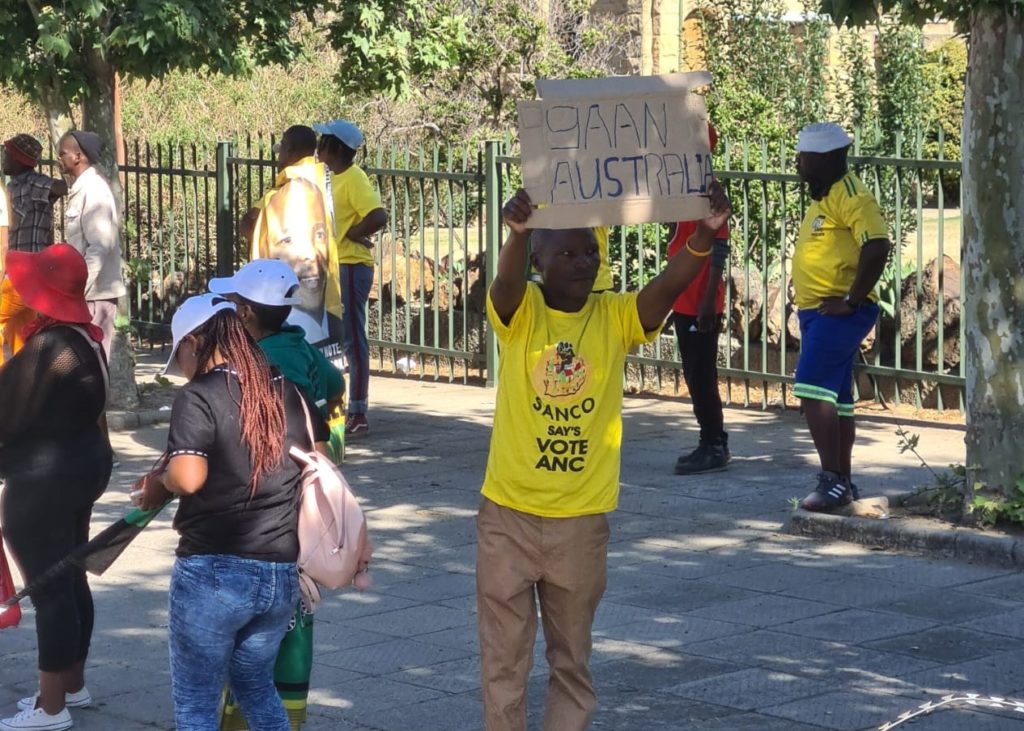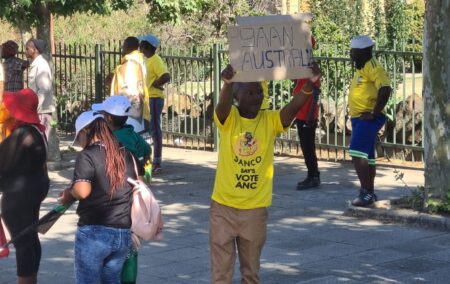There’s always a risk of making too much of small details, of freighting them with larger meanings they perhaps can’t possibly carry.
But the moment I saw the photograph of the ‘GAAN AUSTRALIA’ protester taken in Senekal on Friday by colleague Gabriel Crouse, I sensed I was looking at something that expressed far more than a cursory glance suggested.
The man in the ‘SANCO say’s VOTE ANC’ T-shirt cuts a solitary, static figure among a lounging group that seems otherwise bored, disengaged and uninterested.
The misplaced apostrophe in the say’s on his shirt competes for attention with his scrappy cardboard placard, and the evidence of its maker seeming to have lost heart or energy in clarifying the message.
The small ‘g’ of the first word matches the suggestion of hesitancy in the unfinished rendering of the rest, the author having run out of ink or time or resolve in darkening and thickening all but the S, T and L.

Though the man thrusts his curiously unemotional message upward for all to see, its deficiencies somehow rob it not just of menace, but of conviction. The impression is only heightened by the razor wire in the right-hand bottom corner of the image, an apparently needless barrier against what is so obviously the very picture of lassitude.
There is no knowing what the protester had in mind in – we presume – urging farmers (or is it just white farmers?) to up sticks and leave the country, but there is no escaping how this ANC supporter’s message cuts to the heart of the larger, debilitating contradiction in our politics today, as well as to the creeping weakness of its authors: the ANC itself.
Remarkable boast
Consider that less than 24 hours before the Senekal scene played itself out, President Cyril Ramaphosa made a remarkable boast in Parliament.
‘Our agricultural sector has continued to grow,’ he said, ‘with a bumper maize harvest and the expansion of many high-value crops.’
On the face of it, this is encouraging – an unvarnished acknowledgement by the national leader of the success of a relatively small segment of South Africans who feed the country and help to grow the economy, despite the odds (not least their vulnerability to the criminality and violence that cost Brendin Horner his life),
But how meaningful can this be when you consider that, only four days earlier, Ramaphosa’s administration announced the gazetting of the new Expropriation Law with all the enthusiasm the president brought to his boast of the country’s farming prowess?
The Expropriation Bill stands as the single greatest threat not just to the success of South African agriculture and its capacity to produce bumper crops, but to the entire economy.
The risk could not be put more clearly than the recent warning by Janine Myburgh of the Cape Chamber of Commerce & Industry, who wrote: ‘Investors in a country do not put their money in a place where the basic protection of their money and property is subject to local political party dogma. Leaving disputes to the courts to resolve does not obscure the fact that the decision not to pay compensation, and indeed the decision to expropriate, will be with politicians.’
Weak and deeply indebted
The prospect of a weak, deeply indebted state widening its own powers to take assets that belong to others is the policy equivalent of that Senekal protester’s ‘Gaan Australia’ sentiment.
Two truths are plain. The first is that South Africa’s hopes of economic recovery hinge on farmers not going anywhere, and the same is true of every other loyal, enterprising and law-abiding category of the populace.
The second is that, as long as it is resolved to threaten property, or tell farmers they are not welcome, the ANC is assured that its hopes of recovery will not go anywhere either – and, it inevitably follows, the same is true of its own fate as an effective presence in South African politics.
Look at the picture again, and you will realise how expressive it really is.
[Picture: Gabriel Crouse]
If you like what you have just read, subscribe to the Daily Friend

